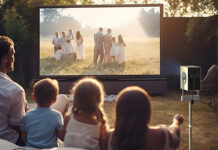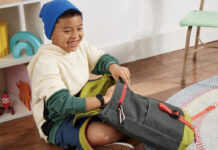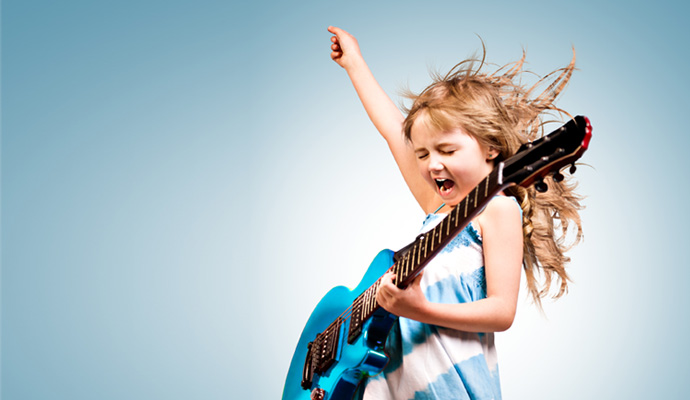
- “When is my child ready for music?”
- “When is my child ready for lessons?”
- “How can I make sure they’ll like it?”
Parents have a lot of questions like these—it’s natural. You don’t want your child to miss out on opportunities or go through a bad experience that turns them off something as wonderful as music.
My three kids are either teens or pre-teens now, but I remember my wife and I wrestling with these very questions. Even though we’re both classically trained pianists and I write and produce music for a living … we STILL grappled with these questions!
The good news is that children naturally find joy in music—any music. They are naturals at it, and it’s never too early to introduce music to your child!
Music can affect children in a positive and profound way. There is something extraordinary that happens when kids have the opportunity to listen, interact, move, dance, sing and express themselves in an honest way through music.
– Jennifer Gasoi
In addition to my own perspective on this subject, I bounced a few ideas off Jennifer Gasoi (2014 Grammy Award Winner: Best Children’s Album). She’s been teaching, performing and creating music for kids and families for over 20 years. She obviously has some fantastic insights and tips. You’ll see her perspective liberally peppered throughout this post.
Positive Side Effects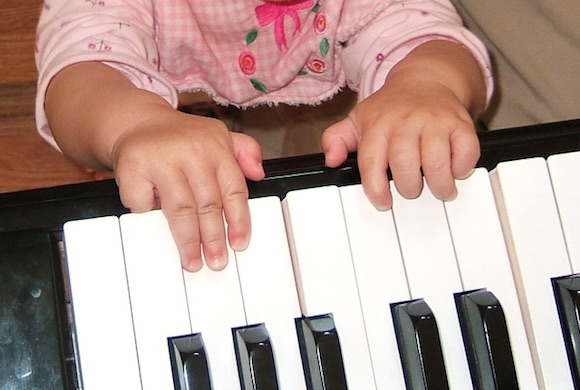
There are numerous studies that stress the benefits of learning music as it pertains to your child’s development of language, motor skills, cognition and more. The findings in those studies suggest some fantastic side benefits to activities outside of the realm of music.
It may be tempting to think that enrolling your child in a music program will make him or her a better student. I’d like to introduce a personal caveat here: having your child participate in music should be to help them become more musical. Exploring and creating music is valuable on its own merit!
Music has the power to transmit ideas and messages that actually resonate in the body and heart, thus creating a fertile ground for creativity, imagination, expression, inspiration and self-confidence.
– Jennifer Gasoi
Music is a language. It may not have convergent meaning like the words we speak and write, but rather it has divergent, emotional meaning that is unique to each and every listener. In order for them to better understand and communicate with music, parents should treat music the same as any other language: let your child hear it often!
Play it! Hear it!
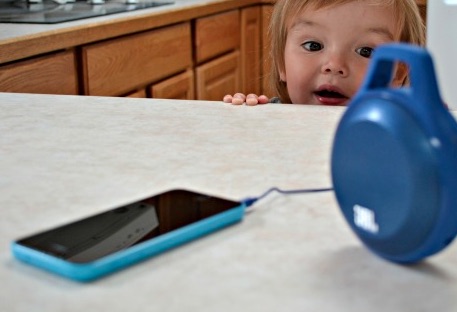 If you’ve got a collection of music, play it for your child. Of all the arts, music is the only one that can be enjoyed and consumed both actively and passively. Turn off the television and play music for your toddler; especially if the television is only turned on for background noise while your toddler plays, reads, or takes naps.
If you’ve got a collection of music, play it for your child. Of all the arts, music is the only one that can be enjoyed and consumed both actively and passively. Turn off the television and play music for your toddler; especially if the television is only turned on for background noise while your toddler plays, reads, or takes naps.
You can have music playing in the car, in the kitchen, in the den … all over the house! Giving them a steady diet of musical variety only helps them expand their tastes and appetite for music.
I have music playing in the house from the moment I get up in the morning to doing the dinner dishes. It changes from week to week, but requests for different styles are constant: from classic rock to jazz to pop to classical to … Minecraft Cover Songs (a genre I was previously unaware of)
What’s the RIGHT Music?
The good news is you don’t have to go out and acquire music from the “children’s” category. In fact, I encourage you to play as wide a variety as possible! It’s not that I forbade the Wiggles or Raffi to be played in my house, but I played as much music as I could from my very diverse music collection.
It is so important for parents to introduce their children to music at an early age. I encourage them to give their children the opportunity to explore and decide for themselves what they like.
I love to compose music in many different styles- to introduce kids to music from all over the world. Both my albums “Songs for You” and “Throw a Penny in the Wishing Well” feature many different genres including bluegrass, jazz, klezmer, calypso, cajun, gospel and swing.
– Jennifer Gasoi
There is no “right” or “wrong” music for children. I have yet to meet a small child who turns away from new music—they have no prejudice about what music is “supposed” to be. Kids don’t have a distaste for abstract or modern visual art, and they don’t turn up their noses at abstract music, either.
Don’t get drawn into the “baby brain” marketing that insists on having your child listen to classical music as a sort of shortcut to higher intelligence in the future. Although a few companies have made a LOT of money promoting this idea, the “Mozart Effect” has been debunked by numerous scientific studies.
When you share music that you enjoy, those feelings will not go unnoticed and will most likely be shared by your child.
Enjoying and Participating in Music
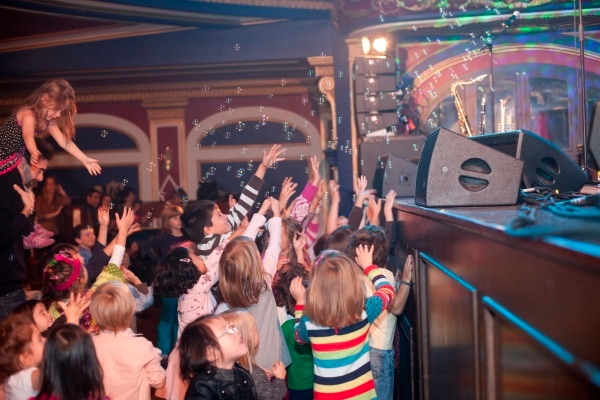 Music, for a young child, is an experience that encourages participation – full body and sometimes loud participation. Being able to make a connection to music through movement is not only enjoyable, but it fosters one of the cornerstones of the art: beat and rhythm. Encouraging your child to dance, move, clap and make noise will go a long way to building strong connections with music.
Music, for a young child, is an experience that encourages participation – full body and sometimes loud participation. Being able to make a connection to music through movement is not only enjoyable, but it fosters one of the cornerstones of the art: beat and rhythm. Encouraging your child to dance, move, clap and make noise will go a long way to building strong connections with music.
Take your kids out to see live music. Look for open-air concerts or venues that encourage moving and dancing. Virtually any and every childrens concert will not only allow moving and dancing, but they will encourage it.
Participating in music isn’t just for live concerts. While listening to music at home or in the car, feel free to sing, hum and make up your own parts.
I recently performed at an inner city school in Montreal for a group of kids- many living in homes with challenging circumstances. There was such an overwhelming response – the entire school was singing along, dancing, and literally vibrating with great energy.
– Jennifer Gasoi
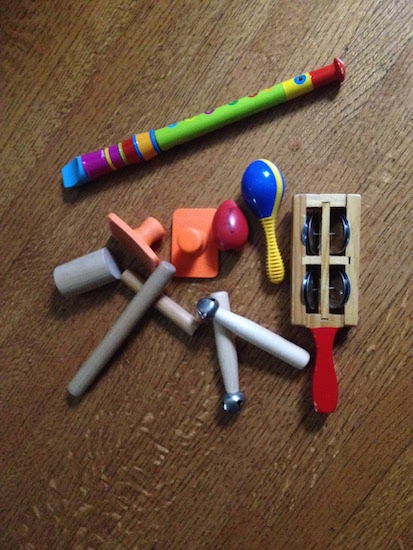
You don’t need to be a musician yourself, but you can even teach your child some critical listening skills through all this activity. Encourage them to try and pick out different rhythms and instruments in the music you’re playing. Have them sing, clap or drum it out. To take it one step further, encourage them to improvise and start creating their own parts.
Instruments (and other noise makers)!
Besides singing, playing and experimenting with percussion is one of the simplest ways to participate in and enjoy music. Provide toys for your kids that sing or play music. Musical toys can not only entertain your little one, they also teach them about music during their playtime.
Rhythm sticks, bells, shakers, drums and even hands are great fun. Having real instruments—even kid-sized ones—for your child gives them the opportunity to explore and gain confidence with music.
Set out different kinds of instruments to give your kids a chance to show you what interests them. When I teach, I use all kinds of different sounds and instruments… shakers, drums, rain sticks, drums, guitar, ukulele, melodica etc… different sounds resonate with different children.
When I was 4 years old I was in a toy store and found a little piano. I started playing “Twinkle Twinkle” to my mom’s surprise. She asked how I knew how to play and I answered “I just do.” Within a few months my parents bought me a piano and I fell in love with the instrument. So exposure is the key. Let your kids show you what they are drawn to.
– Jennifer Gasoi
Lessons
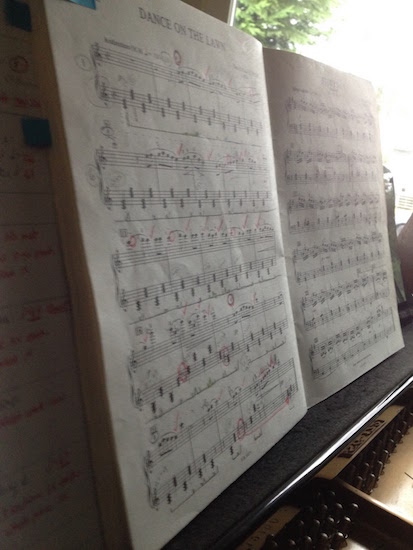 You can enroll your toddler in a music course designed for their age group. Some local preschools, universities, and other venues may offer beginning music classes designed for toddlers that last no more than 45 minutes per class.
You can enroll your toddler in a music course designed for their age group. Some local preschools, universities, and other venues may offer beginning music classes designed for toddlers that last no more than 45 minutes per class.
A lot of early-music lessons are group-based and include parents. These types of classes are fantastic for creating so many positive connections among all the participants through singing and movement.
Don’t throw your child into formal music lessons right away. You’ll most likely be able to tell when and if they’re ready. When they are, in order to avoid music becoming a “chore”, try and be lenient about exploration and creativity at practice time. Unfortunately, formal music lessons can quickly become a burdensome activity in a child’s schedule if it’s viewed as being too structured. That little side-bar doodling or exploring putting hands in the wrong spot stimulates creativity and critical listening—both essential for communicating through music.
I have been teaching these classes for many years and find it such a wonderful way to introduce babies/toddlers to music. It also gives parents a chance to bond with their children and gives them ideas of how they can use music in their daily lives.
– Jennifer Gasoi
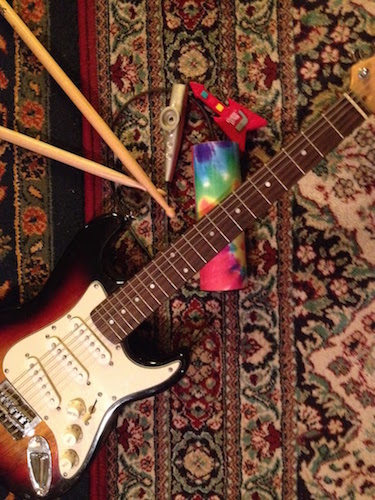
A Musical Life
How your child will incorporate music in their life can never be predicted. Some may absolutely love music and have an appetite for the art that can not be quenched and others may be happy having music be more of a passive activity. Music can be enjoyed, performed and created at any point in ones life—it’s never too late. All manners of participation in music bring unique, deep meaning to all people.
If, as a parent, you can share and foster all the great feelings that music invokes in your child, then they’ve received the seeds to grow their own musical identity.
You have many options for finding a guitar, piano or whatever instrument for your child. You can see many of these options in the musicial instrument section online at Best Buy.


